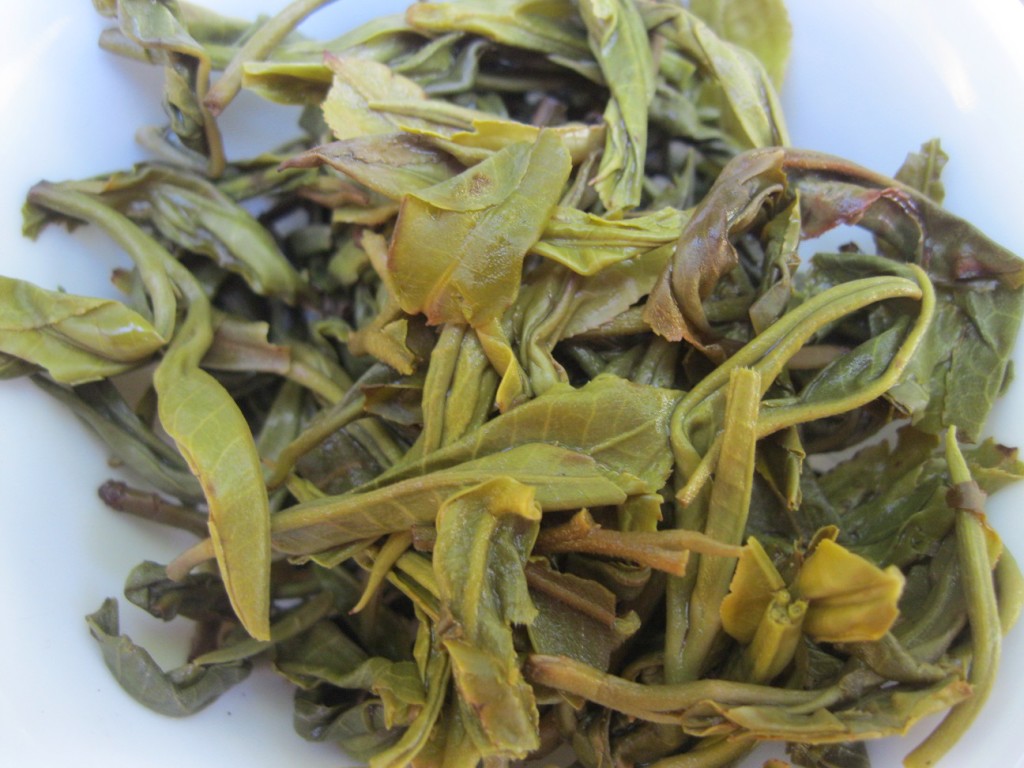Top Pu erh Teas of 2015-’05 II

This is a continuation of a previous discussion on top pu erh terriors over the past 10 years. So far, we’ve covered Lao Banzhang and Naka. Below, an introduction to Bing Dao and Gua Feng Zhai.
Bing Dao
The Bing Dao ancient tea gardens are of the Yunnan large-leaf variety. This terropr is quite blessed. It has come to be called “the true Yunnan large-leaf variety.” The Bing Dao cultivation area is primarily in Lincang City, Shuang Jiang County, Mengku Prefecture at the lower portion of Da Xue Shan encompassing Bing Dao Village, Gong Nong Village, and Greater Mid Mountain. It is the classic Mengku large-tree selection, with long large leaves that possess a black-green color. The leaves are fat and soft. Its fragrance is intense and unique. It is the premium grade among Mengku tea offerings, a pu erh absolutely worthy of storage.
Traits:
Bing Dao eastern mountain is fragrant and flavorful with a rich mouthfeel and a full sweetness. The western mountain Bing Dao expresses a strong and powerful cha-qi with a lasting yun. Ancient tree Bing Dao possesses low astringency. In fact, it is hardly detectable, but its fragrance flourishes. True ancient material should attack the root of the tongue and from there extend toward the tip. The fragrance should fill the chest reaching to the forehead and permeate the sinuses, while leaving the throat with a silky coolness. Overall, the strength of Bing Dao should be felt from the center of the tongue and back and should produce lots of saliva.
The pu erh Junky offers two Bing Dao presently. One is a spectacular Dragon Pearl by Kebu Tea Co. It matches the above description closely. It is lots of fun to drink this, particularly if you’re just interested in fruity goodness. Based upon the description above, this offering hails from the eastern side of the mountain. There is also a pleasant offering called Gentleman, from 2013. It possesses some gentle smoky notes which combine with sweetness and a hint of bitter. It’s a pleasant summer tea, that can be a nice compliment to any morning or afternoon. It is also likely from the eastern region.
Gua Feng Zhai
Gua Feng Zhai ancient tea material possesses qi, fragrance, flavorfulness, and yun. It fundamentally epitomizes a high-quality pu erh tea. Some tea enthusiasts remark upon the fullness of its qi, pointing out its bitterness, but this a shade one-sided. Qi, actually refers to an overall effect that after drinking gives the body a sensation of heat. Of course, not all possess this. Unfortunately, there is no way to use scientific measures to gauge
To speak of bitterness is to only gauge the “outer-qi” of cha-qi. Gua Feng Zhai captures its drinker by virtue of its “inner-qi.” It is appreciated not by way of the nose but by way of what the body comes to know. Regarding this point, it is something that those who practice qi-gong, Chinese medicine, monks and vegetarians can easily sense. pu erh tea naturally goes to the lung and spleen channels. When drunk, the dantian, hands and feet will sweat slightly. In some instances, the sensation will be similar to when the qi arrives (de-qi), as when practicing qi-gong or receiving acupuncture. Whatever its extent, the real captivating attribute of a top pu erh lies with the inner-qi sensation. Furthermore, since every person possesses varying conditions, the inner-qi sensation not only varies but the depth to which it goes necessarily requires the analysis of Chinese medical theory to fully explicate.
Traits: Within the sweet liquor there is a rich honey aroma. Within the soft and smooth refinement there is a strength expressing the cha-qi. It is bitter and subtle. The yun holds in the throat a long time. It is especially useful to consider the long view in light of the beauty that emerges from the transformation with time. New Gua Feng Zhai at first possesses an obvious sweetness, with a deep yun in the throat. The fragrance is also satisfying. Later after transforming, the broth is full and the taste is filling. The bitterness lessens and the astringency retreats, while the aged-taste slowly emerges.
Unfortunately, there are no Gua Feng Zhai in the pu erh Junky stash to date.
